
The benefits of niches in ecommerce
An ecommerce niche is a sales sector that specializes in a specific product category or subcategory.
Sales approaches, both offline and online, are classified here from more categories to fewer:
- Sale of many types of products: These are the traditional department stores and online marketplaces, such as Amazon or AliExpress, where you can buy anything from a kitchen apron to an exercise bike.
- Sale of a single product category: These are businesses or brands that offer a varied product catalog, but limited to a given sector. For example, Zara for clothing, footwear and accessories, and Zara Home for household products. These are umbrella categories, which include many more subcategories.
- Sale of a single product niche: These are companies or brands that specialize in a particular type of product, either because it’s aimed at a minority within the demand, or because it’s limited to a product with a smaller, more specialized and select catalog. A store selling food for a celiac diet or a winery that only offers Italian wines would be examples of niches in the market for ecommerce.
It is important to distinguish between more profitable market niches and ephemeral demands. Niche products respond to a need or interest that has been established over time.
A niche may either lose popularity or make a come-back, depending on what is in fashion at the time, but it’s not the same as best sellers that enjoy very high demand for a few months then disappear, such as spinners in 2017.
→ Also check out: The best online marketplaces
What are the keys to choosing a product niche and succeeding in it?
Discover an audience
By relying on a very specific clientele, your business strategy concentrates on that without having to embrace different interests in the same place, and without the obligation to be alert to new ecommerce trends in widely differing sectors.
It's also easier to find out which design fits better with a niche audience than with a broad audience, and the product content will be more original (and easier to synchronize across all channels using a PIM that will help you to specialize with effective web content).
Develop keyword positioning
In an ecommerce niche, the use of keywords will be much more specialized and you will be able to try out combinations with much less competition.
Campaigns will be better focused due to targeting a segment of buyers that are easier to locate and study, rather than a large crowd with varied concerns. This translates into more targeted content and a higher level of sales conversion, even if the figures for traffic seem lower.
Study your competition
The competition may seem to be more fierce, but it’s actually easier to study what your competitors are doing, as there are fewer of them. You’ll be able to improve your presentation and stand out as a benchmark in your niche, by having such high standards and earning such a good reputation.
A small but steady customer base can be more valuable than a flood of customers who aren’t loyal to your brand.
→ Also of interest: How to improve your SEO in ecommerce
Specialize your product catalog
FOMO (Fear of Missing Out) also exists in business: "What if I lose a lot of customers because I don't include this product in my catalog?
The general trend in ecommerce businesses is based on the greater the range of products, the better. But that’s not always true. Specializing in a particular niche, being less common, makes it easier to gain positioning.
How to distinguish whether a product niche is beneficial
Never dive headlong into the pool, because the water may be shallow: first study a number of indicators of the 'good health' of a product niche.
- Lists of ecommerce trends: Check online sales trends to see if the niche you’re interested in figures among the best-selling products on online marketplaces. This is an indicator that there’s a demand (and perhaps it’s not being well enough served).
- Online analytics: Research niche-related search terms to anticipate the language your customers use.
- Competition: It is always a good sign that there is competition, as it indicates that there’s starting to be enough activity in a niche.
- Influencers: Find out if there are people or accounts talking about your niche and recommending products, as that would provide a great input for your promotion and marketing strategy.
→ Related content: What is cross-selling and how can it improve your sales?
Functionality trends for ecommerce
Firstly, whatever your product sector may be, pay close attention to the technological and marketing innovations that are going to take off most strongly as trends in online sales during the year:
Chatbots
Customer service and product recommendation will be greatly improved by the use of chatbots based on artificial intelligence. This technology is increasingly adopted by online businesses, and facilitates resolving catalog queries on the spot and helping the customer find or discover products.
Payment methods
The most secure and varied online payment methods are necessary. E-wallets such as Apple Pay and Google Pay are the most popular examples of payment systems that an ecommerce cannot do without.
Logistics
Having a good product distribution network is the new strong point of the ecommerce business. China is at the forefront of this sector, which will increasingly incorporate robots and automation systems in order to streamline inventory management and shipping.
Customization
The customer expects constant customization. From the visit to the website (the UX and shopping experience), to the newsletters they receive from your brand or the call with a customer service employee. The software for researching your audience and adapting to them at every stage of the sales process, will gain strength.
Augmented reality (AR)
Video is very 1980s. Shoppers will be increasingly attracted to products they can 'try' in advance... even if it is digitally. Virtual and augmented reality resources, apps and websites are proving to give great sales conversion.
→ Read more: Why discovery commerce improves product positioning
Product niche trends for ecommerce
Natural cosmetics
The term 'natural' embraces a wide range of meanings, yet the niche of beauty products that comprise sustainable sourcing, veganism and/or fewer chemical ingredients, has mushroomed. In addition, this type of clientele seeks to support independent or lesser-known, local businesses, which can greatly benefit their positioning nationally; not to mention the huge amount of attention devoted to this type of product on social networks such as Instagram, or via monthly subscription box services.
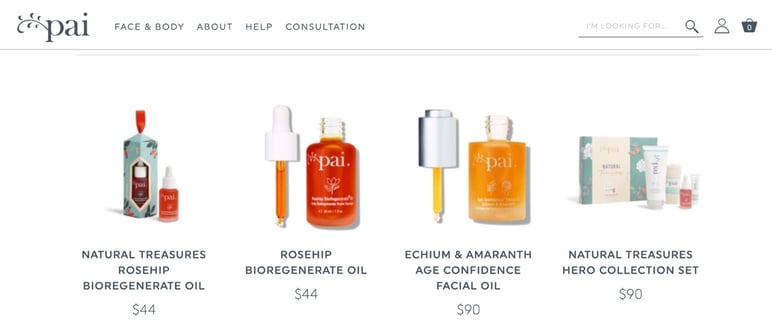
Health foods
Like the previous niche, specialized dietary products are becoming increasingly linked to concern about, and commitment to, the methods of production and the benefits of each ingredient.
Organic and health foods, associated with vegans, vegetarians and celiacs among others, inspire a very wide range of possibilities that include sustainable coffee, vegetable plots, micro-gardens, vases or containers for decorative plants or aromatic herbs, cleaning products without toxic components, reusable coffee cups, and clothes made with recycled materials.
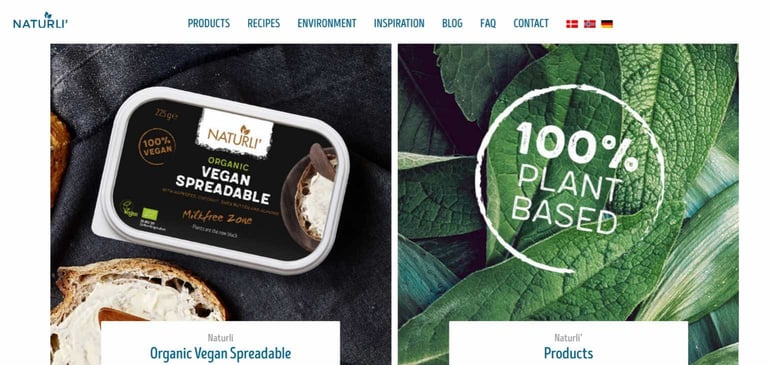
DIY
We're still on the same thread! The interest in becoming organic and sustainable is encouraging a lot of people out there to create their own products; so it's a good opportunity for specializing in supplying those people with the materials they need.
The abundance of tutorials on Instagram and YouTube has led to a boom in supplies for arts & crafts: whether it’s giving old furniture a second life, knitting scarves or gardening.
Materials (such as chalk paint, sustainable wool that’s dyed without harmful chemicals) and tools (sewing machines, silicone guns, DIY appliances...) are in high demand in this ecommerce niche.
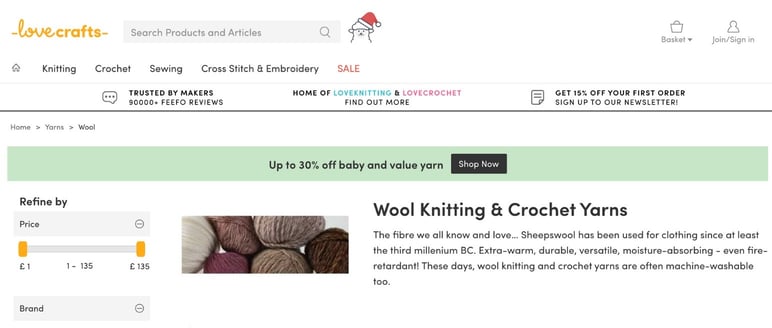
Baby products
Birth rates may not seem to be thriving in the West, but in reality the figures are beginning to recover and this sector is becoming more and more demanding, reflecting a level of concern similar to that of all previous niches.
Parents want good quality, reliable baby accessories, not sourced from the brands of big retail chains as those may contain harmful components.
Demand remains high for strollers and car seats, but also for a long list of healthy food products, cameras and intercoms for surveillance and monitoring, accessories for ‘yoga with baby’, alternatives to pacifiers for the growth phase of babies’ teeth, educational toys, furniture protectors, etc.
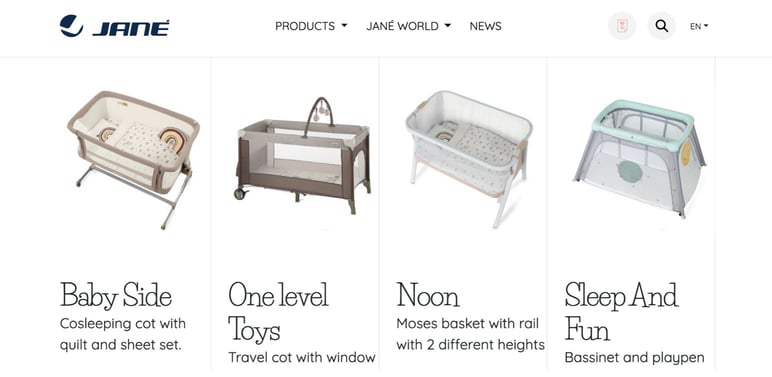
Sports equipment
If the central theme of this year's most profitable niche markets is health and the environment, running is the star of the show. Jogging has become a trend of both fitness and social activity.
Any specialized product for this niche seeks to enhance training and be up to date: special clothing with technological applications – you can even get vibrating leggings – sports apps (including those shared with friends or strangers, and designed to achieve goals), sneakers (recycled, with LED lights), and leads to take your dog attached to your waist.

Vintage products
The niches with demand for vintage products, whether authentic or replicas, are experiencing a fantastic revival.
Rather than staying on the cutting edge with the much criticized fast fashion, a different type of consumers are looking for more durable products that, at the same time, create a classic or retro look. These range from handmade clothes and shoes that bring back fashion styles of yesteryear, to radios, handbags or record players reflecting designs from past decades, which many films and TV series are bringing back into fashion.
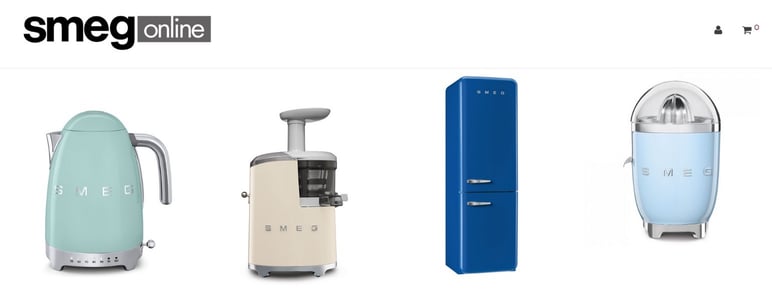
Electronic gadgets
Electronics continues to be one of the most successful sectors in ecommerce, but every year new, untapped market niches appear.
Large numbers of televisions are still sold, but the future (and the current peak of profitability) is in smartwatches, voice assistants, virtual reality goggles, Bluetooth speakers, smart bulbs and wireless charging accessories.
And yes, it looks like electric scooters are going to maintain their popularity in 2022.

Final thoughts
In recent years, high competition within ecommerce has revealed that the greatest opportunities lie in specialization by product niche.
Since specialization requires your content to be more precise and thorough, your best ally will be Product Information Management software, which enables you to monitor the quality of your content and synchronize it perfectly and in real time across all your channels. And not just for 2022: it’s an ally for your company to face the future of sales.
Start with the most popular niche in ecommerce: software like the Sales Layer PIM, which you can try free for 30 days; while using your own product catalog whichever sector you’re in.






.png?width=520&name=Blog%20Partner%20(3).png)

.png?width=520&name=Blog%20Partner%20(1).png)
